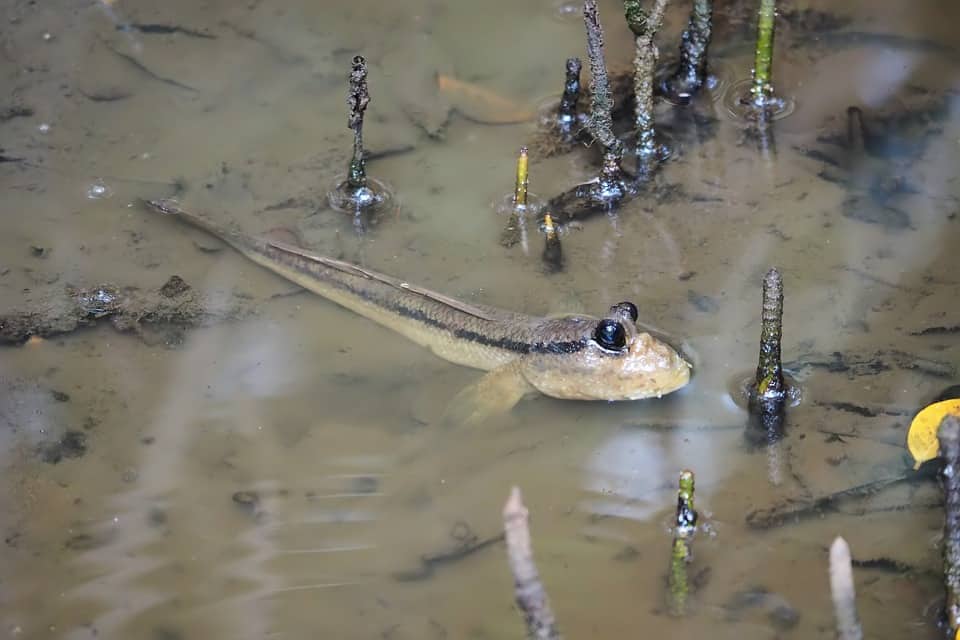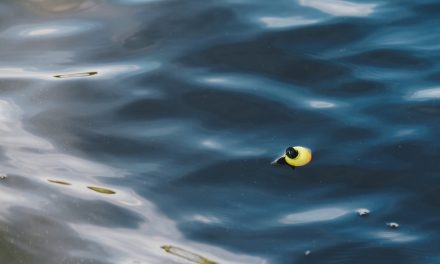If you have ever heard a big fresh-caught king salmon thumping in the ice chest (or, if your kids are not very careful around the goldfish bowl) then you have probably wondered how long that fish will live after it leaves the water.
The time that a fish can live out of water is determined by the species, temperature, and size of the fish. Small tropical fish from an aquarium may only live a few minutes out of the water, while a king salmon may go ten minutes or more, longer in colder weather. There are even several species of fish who do not need water to breathe at all and can live for months on land.
How a Fish Breathes
To understand why a fish can live out of the water, let us look at how they breathe. A typical fish will draw in a mouthful of water, and then expel the water out over the gills. As the water is expelled out of the gills, it flows over thin filaments called gill lamellae, where the dissolved oxygen in the water is absorbed into the bloodstream. Water must pass over the gills for this to happen. When the gills are dry, suffocation begins.
The water and air temperatures can also make a difference in the longevity of a fish out of water. Cold water has a greater density of dissolved oxygen than warm water, so a fish taken from a northern lake in the fall will have a higher blood-oxygen level and live longer out of the water than a fish taken from a lake in Georgia in the summer. If the air is frigid, or the fish is in an ice chest, the lower temps can force a hibernation-like response, slowing the heartbeat and extending the life of the fish by several minutes.
Fish CPR
If you catch a fish (or rescue one from the cat) and it is showing signs of distress, perform “fish CPR” on it when placing it back into the water. Common practice is holding the fish by the tail and gently pulling it back and forth to move water over the gills to help revive it. However, the best way is to grab the lower lip of the fish and do a figure 8 in the water. If the fish has not been out of the water very long then a few repetitions should do the trick.
Fish That Can Survive Out of Water
There are many species of fish that can survive out of the water, some of them for several hours, other species can last for several months or more.
#1: Mudskipper
These unique creatures spent almost three-quarters of their life out of the water. They can absorb oxygen through their skin, and throat. The fish also carries a bubble of air in their gill chamber along with water to keep the gills moist so they will not dry out when exposed to the air. Despite these abilities, the mudskipper must remain in a wet habitat since their skin must remain damp to absorb oxygen.
#2: Walking Catfish
Walking catfish are an invasive species from South America that is making its way up Florida. This hardy fish has an accessory organ above its gill area that functions like a set of gills but for air only. This compartment stays tightly closed while submerged but opens when the fish begins to gulp air. The walking catfish can traverse nearly a quarter of a mile over dry land but must find water before its skin dries out.
#3: Lungfish
As the name implies, this species of fish has both lungs and gills. Found in South America, Africa, and Australia, the lungfish is very rare to encounter. The lungfish can survive solely on oxygen from its gills by going into a dormant state, in which they can survive out of water for up to four years. This is a helpful trait since the lungfish lives in habitats that tend to dry up for long periods of time.
#4: Mangrove Killifish
This little fish can live on land for up to sixty-six days and is known to come out of the water to cool off when the water temperature of its habitat gets too warm. Unlike the walking catfish, the killifish does not use its fins to pull itself across the ground but instead flips itself head-over tail to get where it wants to go.
Conclusion
While fish can live out of the water for several minutes or more, it is best to get them back in the water promptly, and help revive them if needed. For smaller aquarium fish, you need to act fast to keep them alive. In the case of large game fish, they will take a while to expire, and if the flopping bothers you, a sharp blow to the fish’s head with a club will end it promptly. No matter if you are saving, keeping, or releasing the fish, their time out of water is short.
- 10 Types of Fish That You Should Never Eat - May 29, 2021
- What Fish Does Caviar Come From? - May 29, 2021
- How Fishing Has Changed Over Time: A Brief History - May 29, 2021






